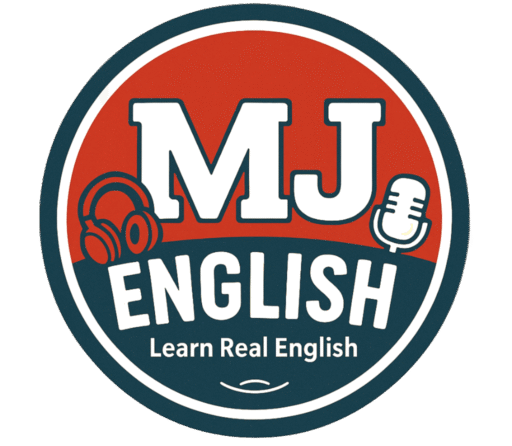你是不是也常遇到這種情況?
早上出門前想說「今天一定準時」,結果 MRT 停駛、下雨塞車、主管提早開會 😅。
在台灣職場中,“I’m late.” 聽起來太直接、甚至有點尷尬,
其實英文母語者更常用 “I’m running late.” 來表達「我快遲到了」的禮貌語氣。
這篇文章要教你:
✅ 怎麼用英文自然說「我遲到了」
✅ 怎麼禮貌地請同事幫忙 cover
🎧Apple Podcast | Spotify
💬 Dialogue|情境會話:台灣上班族的「遲到早晨」
星期一早上 8:50,Kevin 被卡在捷運上,手機訊號又時好時壞。
他用 LINE 打給同事 Emma,請她幫忙通知主管。
English Dialogue
Kevin: Hey Emma, sorry, I’m running late again. The MRT just stopped for no reason.
Emma: Oh no, not again! Taipei traffic and MRT never fail to surprise us.
Kevin: Tell me about it. I left home early and still got stuck on the train.
Emma: Don’t worry, the manager just texted — he’s also stuck in traffic near Daan.
Kevin: Seriously? What a Monday.
Emma: Yep. The morning meeting hasn’t started yet, so you’re fine.
Kevin: That’s a relief. Could you forward me the updated slides? I’ll check them on my phone.
Emma: Sure thing. Oh, and the client joined the meeting link already.
Kevin: Got it. I’ll log in from my phone for now.
Emma: By the way, the coffee shop downstairs reopened! Want me to grab you a latte?
Kevin: You’re a lifesaver! Please make it iced — it’s too hot today.
Emma: Deal. Just don’t rush, safety first.
Kevin: Thanks! I’ll be there in ten.
中文
Kevin: Emma,不好意思,我又要遲到了,捷運又停在半路上。
Emma: 不會吧!台北的交通跟捷運永遠都讓人措手不及。
Kevin: 真的,我提早出門還是卡在車上。
Emma: 放心啦,主管剛傳訊息說他也塞在大安那邊。
Kevin: 認真嗎?典型的星期一啊。
Emma: 哈哈~早會還沒開始,你還有時間。
Kevin: 太好了~你可以幫我轉寄簡報給我嗎?我用手機看一下。
Emma: 沒問題~對了,客戶已經在線上了。
Kevin: 收到,那我先用手機登入。
Emma: 對了,一樓的咖啡店又開了,要不要我幫你買拿鐵?
Kevin: 妳人太好了~幫我買冰的,今天真的熱爆了。
Emma: OK,慢慢來,安全第一。
Kevin: 謝啦~我十分鐘內到!
📚 Vocabulary Boost|重點單字
| 單字 / 片語 | 詞性 | 中文意思 | 英文例句 | 中文翻譯 |
|---|---|---|---|---|
| run late | v. phr. | 遲到、延誤 | I’m running late because of the MRT delay. | 我因捷運延誤會晚到。 |
| stuck | adj. | 被困住的 | I got stuck on the train again. | 我又被卡在捷運上。 |
| manager | n. | 經理、主管 | The manager is running behind schedule. | 主管行程延誤。 |
| meeting | n. | 會議 | The morning meeting starts at 9 a.m. | 早會九點開始。 |
| forward | v. | 轉寄、傳送 | Could you forward me the report? | 你可以轉寄報告給我嗎? |
| client | n. | 客戶 | The client joined the call already. | 客戶已經上線了。 |
| log in | v. phr. | 登入 | I’ll log in from my phone for now. | 我先用手機登入。 |
| grab coffee | phr. | 買杯咖啡 | Let’s grab coffee after the meeting. | 開完會去買咖啡吧。 |
| lifesaver | n. | 救星(口語) | You’re a lifesaver, thanks! | 妳真是我的救星! |
| don’t rush | phr. | 不要太趕 | Take your time, don’t rush. | 慢慢來,不要太趕。 |
🔍 Grammar Focus|常用句型
| 句型結構 | 中文意思 | 英文例句 | 中文翻譯 | 使用時機 |
|---|---|---|---|---|
| I’m running late (for + 名詞). | 我要遲到了 | I’m running late for work. | 我上班會晚到。 | 通勤或電話通知 |
| I got stuck in / on + 名詞. | 被困在⋯ | I got stuck on the train. | 我被困在捷運上。 | 說明原因 |
| Could you + 動詞原形…? | 你能幫我⋯嗎? | Could you forward me the slides? | 你可以幫我轉寄簡報嗎? | 禮貌請託 |
| I’ll log in from… | 從某地登入 | I’ll log in from my phone. | 我用手機登入。 | 遠端會議常用 |
| Don’t rush. | 不要急 | Don’t rush, safety first. | 不用急,安全第一。 | 安撫或關懷語氣 |
📖 Transcript 逐字稿
M: Welcome to MJ English.
M:歡迎收聽 MJ English。
J: Today, we’re looking at something I think we’ve all experienced: that awful Monday morning rush when everything seems to go wrong and suddenly you’re running late for work.
J:今天要聊的主題,我想大家都經歷過——就是那種可怕的星期一早上,什麼都出錯,結果就遲到了!
M: Oh yeah, definitely relatable.
M:完全有共鳴啊~
J: So, we’ve got a quick, realistic chat between two colleagues, Kevin and Emma, to show you how you might handle this sort of thing naturally in English. Let’s listen.
J:所以我們準備了一段 Kevin 和 Emma 這兩位同事的自然對話,來看看遇到這種情況時怎麼用英文應對。來聽聽看。
星期一早上 8:50,Kevin 被卡在捷運上,手機訊號又時好時壞。
他用 LINE 打給同事 Emma,請她幫忙通知主管。
English Dialogue
Kevin: Hey Emma, sorry, I’m running late again. The MRT just stopped for no reason.
Emma: Oh no, not again! Taipei traffic and MRT never fail to surprise us.
Kevin: Tell me about it. I left home early and still got stuck on the train.
Emma: Don’t worry, the manager just texted — he’s also stuck in traffic near Daan.
Kevin: Seriously? What a Monday.
Emma: Yep. The morning meeting hasn’t started yet, so you’re fine.
Kevin: That’s a relief. Could you forward me the updated slides? I’ll check them on my phone.
Emma: Sure thing. Oh, and the client joined the meeting link already.
Kevin: Got it. I’ll log in from my phone for now.
Emma: By the way, the coffee shop downstairs reopened! Want me to grab you a latte?
Kevin: You’re a lifesaver! Please make it iced — it’s too hot today.
Emma: Deal. Just don’t rush, safety first.
Kevin: Thanks! I’ll be there in ten.
中文翻譯
Kevin: Emma,不好意思,我又要遲到了,捷運又停在半路上。
Emma: 不會吧!台北的交通跟捷運永遠都讓人措手不及。
Kevin: 真的,我提早出門還是卡在車上。
Emma: 放心啦,主管剛傳訊息說他也塞在大安那邊。
Kevin: 認真嗎?典型的星期一啊。
Emma: 哈哈~早會還沒開始,你還有時間。
Kevin: 太好了~你可以幫我轉寄簡報給我嗎?我用手機看一下。
Emma: 沒問題~對了,客戶已經在線上了。
Kevin: 收到,那我先用手機登入。
Emma: 對了,一樓的咖啡店又開了,要不要我幫你買拿鐵?
Kevin: 妳人太好了~幫我買冰的,今天真的熱爆了。
Emma: OK,慢慢來,安全第一。
Kevin: 謝啦~我十分鐘內到!
M: Okay, so let’s unpack that a bit. That whole scenario, it feels really familiar, right?
M:好,那我們來拆解一下剛剛那段對話,是不是很有既視感?
J: Totally. The stress is real.
J:超級真實,那種壓力感大家應該都懂。
M: The first thing Kevin said is pretty important: “I’m running late.” Why is that maybe better than just saying, “I’m late”?
M:Kevin 一開始說的那句「I’m running late(我快遲到了)」很重要。為什麼說它比單純的「I’m late(我遲到了)」更好呢?
J: It’s subtle, but it’s all about the tone, you know. “I’m running late” or “just running late” is the standard, polite way native speakers signal a delay.
J:這差別很細微,但主要是語氣的問題。像「I’m running late」或「just running late」是母語者很常用、比較禮貌的說法。
M: It means things are behind schedule or you expect to be delayed. It just sounds a bit less blunt, maybe more apologetic than a flat “I’m late.”
M:它的意思是「我現在有點落後進度,可能會遲到」,聽起來比直接說「我遲到了」還委婉、有歉意一點。
J: Okay, that makes sense. It implies it’s happening now.
J:這樣說得通,也讓人感覺是在當下正在發生的事。
M: And then the reason, this is where it gets useful, I think. Kevin said he “got stuck in the train.”
M:接下來是理由,這邊就很實用了。Kevin 說他「got stuck in the train(被卡在電車裡)」。
J: That phrase, “I got stuck in” or “I got stuck on” plus the noun, like “the train” or “traffic,” it’s essential for explaining delays quickly.
J:像是「I got stuck in/on + 名詞」,像「the train(電車)」或「traffic(塞車)」,是快速說明為何遲到的必備句型。
M: So you get “stuck on the train” or “stuck in traffic.”
M:對,所以你可以說「stuck on the train(被卡在電車上)」或「stuck in traffic(塞在車陣中)」。
J: Precisely. It immediately paints a picture for your manager or your colleague. It explains the situation without you having to go into loads of detail. It signals it’s external.
J:沒錯,這樣能讓主管或同事馬上理解狀況,省得你解釋一堆。重點是這表明這個狀況是你無法控制的外在因素。
M: Something outside your control.
M:像這樣不是你能決定的情況。
J: So what about when you’re delayed but need to kind of work remotely for a bit? Kevin needed slides and offered to log in from his phone.
J:那如果你雖然遲到,但還是想先遠端處理一些工作呢?像 Kevin 就需要簡報檔,還說他會用手機登入。
M: This brings up how you ask for help politely when you’re in a tight spot. Kevin used a key structure there.
M:這時候要怎麼有禮貌地請求幫忙?Kevin 就用了一個很重要的句型。
J: “Could you forward me the updated slides?”
J:「Could you forward me the updated slides?(你可以把更新後的簡報寄給我嗎?)」
M: “Could you…” plus the verb. It’s just a really solid, polite way to make requests. Doesn’t matter if you’re asking a colleague to, you know, forward a report or help with a client issue or send slides like Kevin did.
M:「Could you + 動詞」這句型超萬用又禮貌,不管是請對方轉寄報告、幫忙處理客戶問題,還是像 Kevin 那樣要簡報檔,都能用。
J: And he also followed up straight away with, “I’ll log in from my phone.”
J:而且他馬上補充「I’ll log in from my phone(我會用手機登入)」。
M: Yes, showing initiative. Like, “I’m stuck, but I’m still engaged, still trying to participate.” That’s really important.
M:對,這就是展現積極態度。意思是「雖然我卡住了,但我還是有在參與、有在努力跟上進度」,這很加分!
J: And then, the mood shifts a little bit with the coffee offer from Emma.
J:而後面氣氛有點變化,是 Emma 提議要幫 Kevin 帶咖啡。
M: The “lifesaver” moment.
M:就是那個「救星」時刻啦!
M: What’s great there is the social language. When Kevin says, “You’re a lifesaver,” that’s fantastic colloquial English. It shows real gratitude, much warmer than just “thanks.”
M:這段很棒的地方是社交用語。「You’re a lifesaver(你真是我的救星)」是超地道的口語,表達出比「thanks」更熱情、更感激的情緒。
J: It kind of breaks the tension a bit too, doesn’t it?
J:也能化解一些緊張氣氛對吧?
M: It really does. It reinforces that colleague bond. And Emma’s final piece of advice: “Don’t rush, safety first.” That’s important too.
M:完全可以,還能加強同事間的情誼。Emma 最後那句「Don’t rush, safety first(別急,安全最重要)」也很值得學。
J: Why is that significant?
J:那句話有什麼特別的意義?
M: Well, it’s just a caring way to end the conversation, right? It shows concern for Kevin’s well-being over absolute punctuality at that point. It reinforces that the delay, while inconvenient, is understood. It’s about safety.
M:因為這是一種體貼又溫暖的結尾方式。它表示她更在意 Kevin 的安全,而不是準不準時。讓對話結束得有溫度,也表達對遲到情況的理解。
J: So putting it all together, that conversation covered quite a bit. How to apologize effectively, explain the delay using that “stuck in/on” phrase…
J:總結一下,這段對話涵蓋的重點很多喔,像是怎麼有技巧地道歉、怎麼用「stuck in/on」來解釋遲到。
M: …ask for help politely with “Could you…”
M:還有怎麼用「Could you…」有禮貌地請求幫忙。
J: And even use some of that warmer, social language, like “lifesaver.”
J:還有那種更有情感的口語表達,例如「lifesaver」。
M: And we touched on some useful vocabulary too, like “client,” “forward,” and the very common phrase “grab coffee.” It’s all about understanding not just the words, but the strategy behind why you choose certain phrases in these situations. It makes communication much smoother.
M:而且我們還提到一些常見單字,像是「client(客戶)」、「forward(轉寄)」還有「grab coffee(買杯咖啡)」。學英文不只是記單字,更要懂為什麼選用這些字句,才能讓溝通更順暢。
J: So, if you want the full transcript of that dialogue, the key vocabulary and those useful sentence patterns we discussed, just click the link below.
J:如果你想要完整逐字稿、重點單字表和實用句型整理,記得點下面的連結。
M: Thanks for chatting with us today. Keep practicing, and we’ll catch you next time on MJ English.
M:謝謝今天收聽~繼續多多練習,下次 MJ English 見囉!
✅ Quick Check 小測驗
📌 延伸閱讀建議
- 〈職場英文必學:Meeting English 開會英文實戰指南〉
- 〈Coffee Break Chat:茶水間英文小聊術〉



